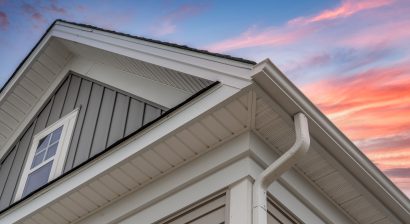Appliance Home Maintenance Guide

Have you given your home appliances the attention they need lately? With regular maintenance for your property like cleaning gutters, having your HVAC system serviced, and cleaning the chimney, the upkeep of your home appliances is often overlooked. Let’s dive into why it’s important to care for them and how to do so.
In this appliance home maintenance guide, we’ll walk you through all the necessary home appliance maintenance you should do regularly to keep your appliances in great shape.
5 Ways of Maintaining Domestic Appliances
All appliances break down, but with regular maintenance, you can take preventative measures. Not only does this save you time from dealing with a broken appliance, but it can save you a lot of money.
Here are the top five ways to properly maintain your appliances:
1. Clean your appliances
Your appliances need just as much TLC as everything else in your house. Take the dishwasher, for example. You use it to clean your dishes, but how often do you clean the dishwasher? If you don’t, it won’t do as effective of a job washing your dishes, and it could break prematurely from build-up.
Read your appliance manual to determine the safest way to clean each appliance, and consider adding it to your monthly home checklist.
2. Inspect your appliances annually
Keep a checklist for every appliance in your house, the last time they were serviced, and when they are due. Maintenance doesn’t mean repairs. It simply means having a technician inspect your appliances. They can ensure they are in good working condition and don’t need repairs.
The benefit of regular maintenance is you can catch issues early before they cause a total breakdown and cost you more money. For example, suppose the dishwasher technician notices a part is wearing down. In that case, he might recommend replacing it immediately before the dishwasher stops working and the broken part affects other dishwasher parts, costing you more money in the long run.
3. Know your appliance’s limits
Don’t push any appliance past its limits. For example, know how much your washing machine can handle or what outlet a larger appliance needs. Pushing appliances beyond their limits can reduce their life expectancy and even put your home in danger.
4. Avoid DIY unless you’re an expert
You might think you’re saving money DIYing your appliance maintenance, but you could save yourself more by using a professional. This is crucial if you have a warranty on the appliance. If you do the work yourself and don’t do it wrong, you might void the warranty and have to pay out of pocket for any repairs.
5. Only use appliances for their intended use
Don’t try to push your home appliances to do more than they were meant to do. Even if you’re in a hurry or think the appliance is capable, you’ll put too much stress on it, causing it to break prematurely.
What Maintenance Do Appliances Need?
So what maintenance do appliances need? Check out our appliance home maintenance guide checklist below.
Kitchen Appliances
Let’s start with kitchen appliances since this is where you’ll find most of your appliances.
Ovens
The most delicious meals are cooked in your oven, especially when you entertain. So keeping it in tip-top condition is essential to avoid an oven that stops working at the worst times.
- Clean the oven – As often as your manual says, clean your oven, usually every three months. This is especially important if you burn something or have significant spills. Many ovens today have self-cleaning mechanisms. Ensure you know how they work, and use them as often as the manual says is best.
- Recalibrate your oven’s temperature – If your oven’s temperature seems off, consult your owner’s manual to determine how to recalibrate it. To do it, you’ll need a high-quality oven thermometer and the procedures outlined in your oven manual.
- Regular service – Set up annual service for your oven, having it professionally checked for any issues, especially dirty or broken coils. This routine maintenance can prevent your oven from breaking down at the worst times.
Refrigerator and Freezer
Your refrigerator and freezer store your food and keep them safe. Keeping these appliances working well is the key to food safety in your home. Here are some tips for maintaining them.
- Clean the refrigerator – Unplug your refrigerator every two to three months, remove all shelves and drawers, wash them with warm water and soap, or use a gentle cleaning solution. Then, dry them completely before returning them and plugging the appliance in again.
- Clean condenser coils – You can use a clean cloth or condenser coil brush to clean off the dust and debris on the coils. If left untouched, the dust and debris can build up and cause the coils not to work. You can find the coils at the bottom of most refrigerators behind the grill.
- Clean fridge gaskets – The gaskets on your refrigerator doors help the refrigerator seal properly. If you let food build up on them, the door won’t seal, which means the fridge must run longer and harder, putting premature wear and tear on it. Clean the door gaskets monthly to prevent this.
- Remove ice build-up in the freezer – If your freezer builds up with ice, defrost it, carefully remove it (don’t use a knife), and restart the freezer. Do this when you have minimal food in the freezer unless you have another freezer to store the food.
Dishwasher
Your dishwasher should clean your dishes, but if you don’t maintain them properly, they may not clean as well as you hoped. Here are some key ways to maintain your dishwasher.
- Monitor the water temperature – Keep your dishwasher’s water temperature at 120 degrees. This is the ideal temperature to remove food residue and germs without causing residue to harden or certain cleaners not to work.
- Clean the door – Look at the door on your dishwasher. If you see food or water build-up, you may also have mold growth. This can cause an unpleasant smell and risk your family’s health. At least once a month, clean the door and all its crevices to remove any build-up.
- Clean the filter – Every dishwasher has a filter that, over time, gets built up. Check your owner’s manual, but you can usually clean it by removing the bottom rack and the screen over the filter. Next, take a wet/dry vac to the filter to remove any build-up.
Other Appliances
Your kitchen has the most appliances, but a few others around the house also need maintenance.
Furnace and A/C
You rely on your furnace and A/C to keep your home comfortable, but they may not do an adequate job without proper maintenance.
It’s important to have both units checked and cleaned annually. Schedule the appointments for a month or two before you’ll need to use them in case of any problems. It’s easier (and cheaper) to fix problems in their early stages rather than waiting for the units to stop working entirely.
It’s also essential to change the filters monthly and to have any unusual noises or changes in temperature checked immediately. The sooner you fix any issues, the less damage it can do to the unit’s other parts.
Washing Machine and Dryer
Nothing is worse than your washing machine breaking down mid-cycle or being without your washer and dryer for long periods. Fortunately, with regular maintenance, you can keep them running optimally.
Here are some key ways to maintain your washer and dryer:
- Periodically check the hot and cold water connections to ensure they aren’t loose and no water is leaking
- Wash the washing machine monthly using vinegar and hot water (no clothes)
- Keep the detergent drawer free from caked-up detergent
- Clean the dryer’s lint screen before each use
- Have your air ducts cleaned annually
- Don’t over or underload your washing machine; read the manual to determine the ideal size load; using any other size load can strain your appliances
Can you Extend the Life of Your Appliances?
Maintaining your appliances is the number one way to prolong their lives. The more TLC they get from you and professionals, the longer they will last. Here are a few other essential tips to keep your appliances running smoothly:
- Get rid of any old food in your refrigerator or freezer, as they can cause bacteria and mold growth, reducing your appliance’s lifespan
- Clean your appliances monthly or as often as you can if monthly is too often
- Don’t overuse your appliances, and whenever possible, switch them off or unplug them
- Read the owner’s manual and ensure you use the right products, such as soap and other cleaners on the appliances
- Stay on top of professional maintenance and cleaning schedule
- Don’t store items on top of your refrigerator, as this decreases airflow and can cause problems for your refrigerator
How Often Should You Service Appliances?
It’s essential to get your appliances on a regular service schedule. Setting a yearly standing date for appliance maintenance will keep your appliances running at their best.
Schedule the appointments throughout the year, paying close attention to the weather for appliances, like your HVAC system, so you have them serviced right before you use them the most.
Other appliances, such as the stove, oven, refrigerator, and dishwasher, can be serviced any time of year, but consider right before you’ll use them the most, such as the holidays.
How Do I Make a Home Maintenance Checklist for Appliances?
One of the best tips we can provide in our appliance home maintenance guide is to create a home maintenance checklist for appliances.
This ensures you don’t miss any important servicing dates and prolong the life of your appliances.
You can combine your home maintenance checklist for appliances with your home maintenance checklist for other areas of your home or keep it separate. The key is keeping track of what your home needs and scheduling the appointments early.
The easiest way is to break your tasks down by season or time of year. Think of when you’ll use each appliance the most, and schedule your maintenance for right before those times.
This ensures your appliances will work at their best when you need them the most and reduces the chance of a breakdown when it would be most inconvenient.
What are the Top Other Home Maintenance Tasks?
Your appliances are just a tiny part of your home maintenance tasks each year. Here are a few other key areas to focus on:
Outdoors
We often think of home maintenance as taking place indoors, but many areas outside need your attention, too, including the following:
- Lawns, hedges, and trees need trimming, manicuring, and watering
- Gutters need cleaning and repairing, especially before winter
- Driveways and sidewalks should be checked for cracks
- Houses need to be washed and painted periodically (usually every few years)
- Patios and decks must be cleaned and maintained
Indoors
Inside, there are plenty of areas that need your attention, including the following:
- Plumbing systems should be checked for leaks, as should faucets
- Check drywall and ceilings for signs of water stains
- Check that your sump pump is draining well, especially during rainy seasons
- Chimneys need annual cleaning and checkups
- Smoke alarms and carbon monoxide detectors should be tested annually
Create a schedule so that you check all areas of your home every year, whether at the same time or break it up throughout the year. Properly maintaining your home will ensure it works well and costs less should anything stop working.
FAQ
Can appliances last 20 years?
Today, appliances last anywhere from 8 – 15 years, but 20 years isn’t unheard of for major appliances. The longest-lasting appliance is usually the furnace, but on average, expect appliances to need replacing in an average of 10 years.
Why do newer appliances not last as long?
No one knows why older appliances last longer than newer ones, but newer ones have many benefits. First, they are usually much more efficient, and it’s usually much easier to locate parts for newer appliances versus older ones. New appliances also have many more ‘smart features’ that older appliances don’t have.
How often should you clean your washer and dryer?
It’s imperative to clean your washer and dryer regularly. Try cleaning your washer at least every month; It’s easy to clean your washing machine since it only needs hot water and two cups of vinegar. Run an empty cycle with the vinegar to clean it, and then run a plain cycle to remove the vinegar smell from the washing machine while sanitizing it.
You should also clean your dryer before each use. Not removing the lint from your dryer could cause a fire, so cleaning it ensures you keep your house safe and dries your clothes faster too.
Do more expensive appliances last longer?
Typically, more expensive appliances last longer because manufacturers use higher quality parts because of the higher price tag. But, of course, like anything, there’s no guarantee in life, so not all expensive appliances last longer.
Final Thoughts
This appliance home maintenance guide is to help you determine how and when to take care of your appliances. The better care you take of them, the more time you’ll get out of them, and the better it will be on your energy usage.
Taking care of appliances may feel like a pain, but it’s worth the effort, especially if they save you time, money, and hassle in the long run.






